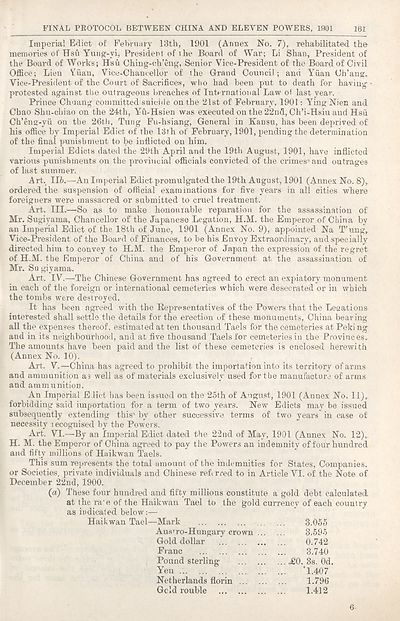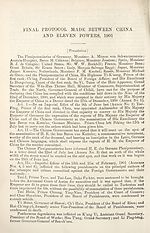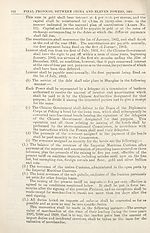1918
(229) Page 161
Download files
Complete book:
Individual page:
Thumbnail gallery: Grid view | List view

FINAL PROTOCOL BETWEEN CHINA AND ELEVEN POWERS, 1901
161
Imperial Edict of February 13th, 1901 (Annex No. 7), rehabilitated the
memories of Hsu Yung-vi, President of ihe Board of War; Li Shan, President of
the Board of Works; Hsu Ching-eh’eng, Senior Vice-President of the Board of Civil
Office; Lien Yuan, Vice-Chancellor of the Grand Council; and Yuan Ch’ang,
Vice-President of the Court of Sacrifices, who had been put to death for having
protested against the outrageous breaches of International Law of last year.
Prince Ghuang committed suicide on the 21st of February, 1901: Ying Nien and
Chao Shu-chiao on the 24th, Yu-Hsien was executed on the 22nd, Ch’i-Hsiu and Hsii
Ch’eng-yii on the 26th, Tung Fu-hsiang, General in Kansu, has been deprived of
his office by Imperial Edict of the 13th of February, 1901, pending the determination
of the final punishment to be inflicted on him.
Imperial Edicts dated the 29th April and the 19th August, 1901, have inflicted
various punishments on the provincial officials convicted of the crimes* and outrages
of last summer.
Art. 116.—An Imperial Edict promulgated the 19th August, 1901 (Annex No. 8),.
ordered the suspension of official examinations for five years in all cities wliere
foreigners were massacred or submitted to cruel treatment.
Art. III.—So as to make honourable reparation for the assassination of
Mr. Sugiyama, Chancellor of the Japanese Legation, H.M. the Emperor of China by
an Imperial Edict of the 18th of June, 1901 (Annex No. 9), appointed Na T’ung,
Vice-President of the Board of Finances, to be his Envoy Extraordinary, and specially
directed him to convey to H.M. the Emperor of Japan the expression of the regret
of H.M. the Emperor of China and of his Government at the assassination of
Mr. Sugiyama.
Art. IV.—The Chinese Government has agreed to erect an expiatory monument
in each of the foreign or international cemeteries which were desecrated or in which
the tombs were desti'oyed.
It has been agreed with the Representatives of the Powers that the Legations
interested shall settle the details for the erection of these monuments, China bearing
all the expenses thereof, estimated at ten thousand Taels for the cemeteries at Peki ng
and in its neighbourhood, and at five thousand Taels for cemeteries in the Provinces.
The amounts have been paid and the list of these cemeteries is enclosed herewi th
(Annex No. 10).
Art. V.—China has agreed to prohibit the importation into its territory of arms
and ammunition as well as of materials exclusively used for the manufacture of arms
and ammunition.
An Imperial Edict has been issued on the 25th of August, 1901 (Annex No. 11),
forbidding said importation for a term of two years. New Edicts may be issued
subsequently extending this’ by other successive terms of two years" in case of
necessity lecognised by the Powers.
Art. VI.—By an Imperial Edict dated the 22nd of May, 1901 (Annex No. 12),
H. M. the Emperor of China agreed to pay the Powers an indemnity of four hundred
and fifty millions of Haikwan Taels.
This sum represents the total amount of the indemnities for States, Companies,
or Societies, private individuals and Chinese referred to in Article VI. of the Note of
December 22nd, 1900.
(a) These four hundred and fifty millions constitute a gold debt calculated
at the raJe of the Haikwan Tael to the gold currency of each country
as indicated below:—
Haikwan Tael—Mark 3.055
Ausrro-Hungary crown 3.595
Gold dollar 0.742
Franc 3.740
Pound sterling ,£0. 3s. Od.
Yen ‘1.407
Netherlands florin 1.796
Geld rouble 1.412
161
Imperial Edict of February 13th, 1901 (Annex No. 7), rehabilitated the
memories of Hsu Yung-vi, President of ihe Board of War; Li Shan, President of
the Board of Works; Hsu Ching-eh’eng, Senior Vice-President of the Board of Civil
Office; Lien Yuan, Vice-Chancellor of the Grand Council; and Yuan Ch’ang,
Vice-President of the Court of Sacrifices, who had been put to death for having
protested against the outrageous breaches of International Law of last year.
Prince Ghuang committed suicide on the 21st of February, 1901: Ying Nien and
Chao Shu-chiao on the 24th, Yu-Hsien was executed on the 22nd, Ch’i-Hsiu and Hsii
Ch’eng-yii on the 26th, Tung Fu-hsiang, General in Kansu, has been deprived of
his office by Imperial Edict of the 13th of February, 1901, pending the determination
of the final punishment to be inflicted on him.
Imperial Edicts dated the 29th April and the 19th August, 1901, have inflicted
various punishments on the provincial officials convicted of the crimes* and outrages
of last summer.
Art. 116.—An Imperial Edict promulgated the 19th August, 1901 (Annex No. 8),.
ordered the suspension of official examinations for five years in all cities wliere
foreigners were massacred or submitted to cruel treatment.
Art. III.—So as to make honourable reparation for the assassination of
Mr. Sugiyama, Chancellor of the Japanese Legation, H.M. the Emperor of China by
an Imperial Edict of the 18th of June, 1901 (Annex No. 9), appointed Na T’ung,
Vice-President of the Board of Finances, to be his Envoy Extraordinary, and specially
directed him to convey to H.M. the Emperor of Japan the expression of the regret
of H.M. the Emperor of China and of his Government at the assassination of
Mr. Sugiyama.
Art. IV.—The Chinese Government has agreed to erect an expiatory monument
in each of the foreign or international cemeteries which were desecrated or in which
the tombs were desti'oyed.
It has been agreed with the Representatives of the Powers that the Legations
interested shall settle the details for the erection of these monuments, China bearing
all the expenses thereof, estimated at ten thousand Taels for the cemeteries at Peki ng
and in its neighbourhood, and at five thousand Taels for cemeteries in the Provinces.
The amounts have been paid and the list of these cemeteries is enclosed herewi th
(Annex No. 10).
Art. V.—China has agreed to prohibit the importation into its territory of arms
and ammunition as well as of materials exclusively used for the manufacture of arms
and ammunition.
An Imperial Edict has been issued on the 25th of August, 1901 (Annex No. 11),
forbidding said importation for a term of two years. New Edicts may be issued
subsequently extending this’ by other successive terms of two years" in case of
necessity lecognised by the Powers.
Art. VI.—By an Imperial Edict dated the 22nd of May, 1901 (Annex No. 12),
H. M. the Emperor of China agreed to pay the Powers an indemnity of four hundred
and fifty millions of Haikwan Taels.
This sum represents the total amount of the indemnities for States, Companies,
or Societies, private individuals and Chinese referred to in Article VI. of the Note of
December 22nd, 1900.
(a) These four hundred and fifty millions constitute a gold debt calculated
at the raJe of the Haikwan Tael to the gold currency of each country
as indicated below:—
Haikwan Tael—Mark 3.055
Ausrro-Hungary crown 3.595
Gold dollar 0.742
Franc 3.740
Pound sterling ,£0. 3s. Od.
Yen ‘1.407
Netherlands florin 1.796
Geld rouble 1.412
Set display mode to:
![]() Universal Viewer |
Universal Viewer | ![]() Mirador |
Large image | Transcription
Mirador |
Large image | Transcription
Images and transcriptions on this page, including medium image downloads, may be used under the Creative Commons Attribution 4.0 International Licence unless otherwise stated. ![]()
| Asian directories and chronicles > 1918 > (229) Page 161 |
|---|
| Permanent URL | https://digital.nls.uk/194896307 |
|---|
| Attribution and copyright: |
|
|---|---|
| Description | Volumes from the Asian 'Directory and Chronicle' series covering 1917-1941, but missing 1919 and 1923. Compiled annually from a multiplicity of local sources and research. They provide listings of each country's active corporations, foreign residents and government agencies of all nationalities for that year, together with their addresses. Content includes: various treaties; coverage of conflicts; currencies and taxes; consular fees; weights and measures; public holidays; festivals and traditions. A source of information for both Western states and communities of foreigners living in Asia. Published by Hongkong Daily Press. |
|---|---|
| Shelfmark | H3.86.1303 |
| Additional NLS resources: |

